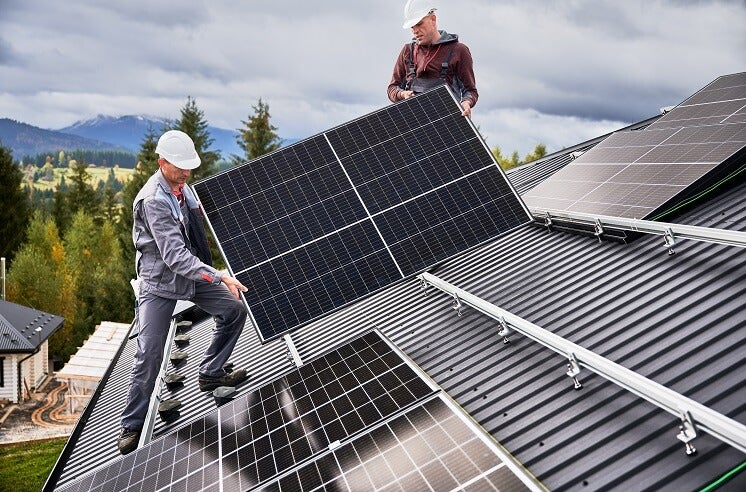Solar panels are becoming increasingly common, especially among Americans. Roofs can serve a dual purpose, not just protecting us from the elements, but also generating power for buildings and constructions. If you’re considering installing solar panels on your roof, this article will answer all your questions.
How Heavy Are Solar Panels?
Solar panels can weigh anywhere from 20 to 50 pounds, depending on their size and type. To distribute their weight evenly, a racking system is used. On average, solar panels can add between 2.3 to 2.8 pounds to each square foot of your roof, depending on their specific type.
How Big Can Solar Panels Get?
Most residential solar panels are 65 inches wide and 39 inches long. For more details about the weight and size of various solar panels, refer to the table below:
| Brand and Size of Solar Panels | Total Weight of Panel | Weight per Sq. Ft. |
|---|---|---|
| Renogy Monocrystalline Solar Panel 320 Watt | 40.8 lbs. | 0.44 lbs./sq. ft. |
| 150 Watt Polycrystalline Legion Solar Panel | 25.65 lbs. | 0.42 lbs./sq. ft. |
| Nature Power 110 Watt Polycrystalline Solar Panel | 18.30 lbs. | 0.41 lbs./sq. ft. |
| Nature Power 22 Watt Amorphous Solar Panel | 5.1 lbs. | 0.52 lbs./sq. ft. |
What Makes Solar Panels Heavy?
Solar panels consist of various components, including an aluminum frame, tempered glass, solar cells with strings, a junction box, encapsulation foils, and a backsheet. While solar cells themselves are relatively light, the majority of the panel’s weight comes from the aluminum frame and the glass. The materials used in the panel play a significant role in determining its weight.
Types of Solar Panels
There are two main types of solar panels:
- Monocrystalline Panels: These are heavier and are primarily used in commercial buildings but are also suitable for residential use. They weigh around 50 pounds but generate substantial power.
- Polycrystalline Panels: Initially less popular, they have become a common choice for homes due to their affordability and improved efficiency. Polycrystalline panels weigh approximately 42 pounds on average and offer good energy performance.
How Many Panels Do I Need?
The number of panels required depends on your energy consumption and power needs. Begin by assessing your daily electrical requirements, including lights, fans, and appliances. Multiply the watts each device uses by the hours you use them to calculate your daily energy needs.
This information will help you determine the number of panels required to meet your daily energy demand.
On average, in the U.S., households consume about 11,000 kWh annually. To generate this amount, you’d need a 250 kW solar panel system, which translates to approximately 28-34 panels per household.
Can Your Roof Support Solar Panels?
To determine if your roof can support solar panels, consider factors such as the size and weight of the panels. For instance, a 6 kW installation comprising 20 panels would weigh between 700 and 800 pounds, which is about 2.3-3 pounds per square foot.
The majority of houses, approximately 95%, can easily handle a weight of over 3 pounds per square foot. If your roof is older, consider consulting roofing companies or solar panel providers for necessary adjustments. It’s advisable to have an architect or structural engineer inspect your roof to ensure it’s suitable for installation without compromising your goals.
Impact of Snow on Solar Panels
If you reside in an area with heavy snowfall, consult with an engineer or the solar panel provider. They will assess the situation and take necessary precautions to ensure that snow doesn’t affect your solar panels. Generally, snow weight shouldn’t be an issue, but in extreme cases, professionals will provide the needed support and care for your roof.
This post was written by Daniel Massaad, owner and expert solar technician at Energy Solutions Direct! ESD is the top choice for solar companies Tampa! Our licensed and certified contractors are masters of their craft; with years of experience servicing the great Tampa Bay area and beyond, the choice is simple. ESD excels at offering you the best in solar value!

